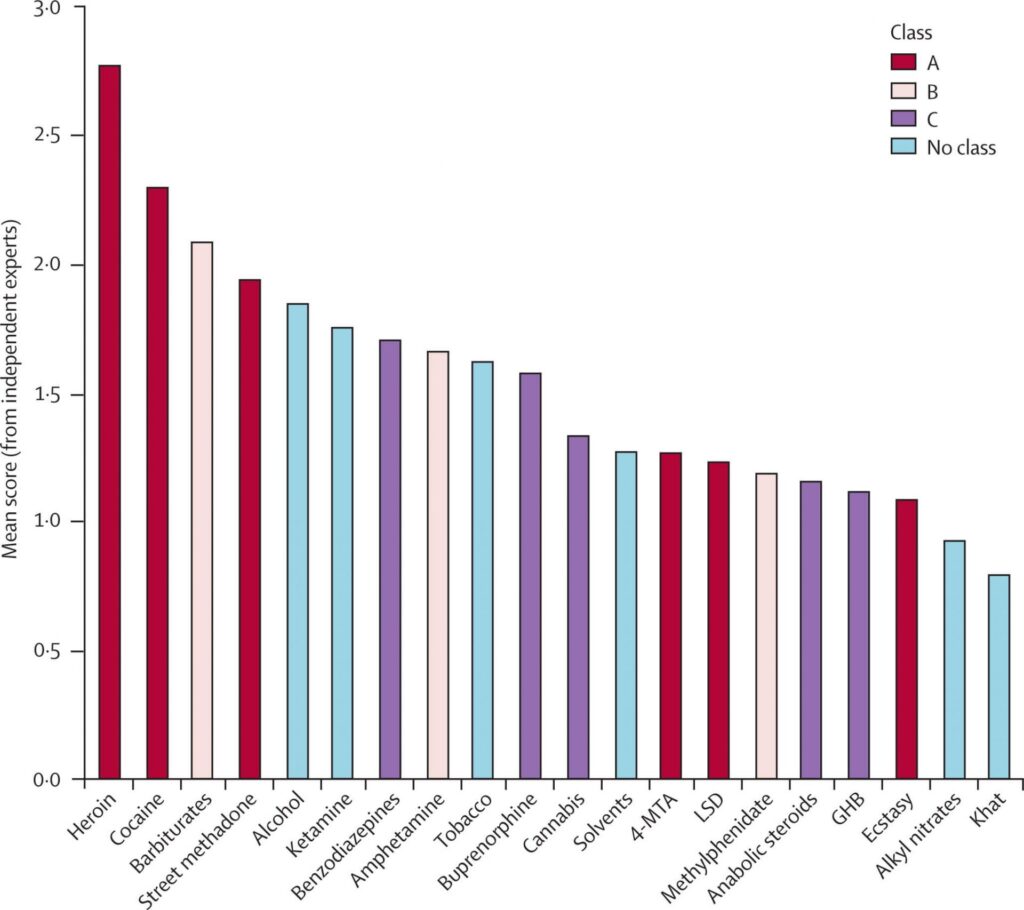
One of the recurring themes of the Beckley Foundation seminars over the last few years has been highlighting the haphazard and inflexible nature of the current classification system for illegal drugs, which often bears little relationship to the real harms (and in some cases benefits) of the different substances, and omits any comparison with legal and prescribed drugs which can be even more dangerous to their users and more costly to society. Indeed, as the Government’s own Science and Technology Committee’s report, ‘Drug Classification: making a hash of it’ concludes:
“The classification system, purports to rank drugs on the basis of harm associated with their misuse, but we have found glaring anomalies in the classification system as it stands and a wide consensus that the current system is not fit for purpose …The problems we have identified highlight the fact that the promised review of the classification system is much needed and we urge the Government to proceed with the consultation without delay. We have proposed that the Government should develop a more scientifically based scale of harm, decoupled from penalties for possession and trafficking. In addition, we have argued that there is an urgent need for greater investment in research to underpin policy development in this area.”
This article has its roots in the talks given by Professor Colin Blakemore at two of the Beckley Foundation seminars: An Interdisciplinary Perspective on Alcohol and Other Recreational Drugs, held at Admiralty Arch, in collaboration with the Cabinet Office Strategy Unit, in 2003, and the Global Drugs Policy Seminar at the House of Lords in 2004. This influential paper put forth a new scale of drug-related harms based upon the comparative classification of twenty substances. The paper, co-authored by Prof Blakemore and Prof David Nutt, et al., presents a scale of harms based on three scales – physical harm, dependence and social harm – which were independently assessed by two groups of experts from the fields of chemistry, pharmacology, forensic science, psychiatry and other medical specialties. The results, as shown below, are that the new scale of harm is quite inconsistent with the current ABC drug classification system in the UK. This new scale and the methods employed in its development offers a systematic framework and process that could be used by current regulatory bodies to assess the harm of current and future drugs of abuse, and can readily accommodate new evidence as and when it emerges.
The Graph shows the overall mean scores of the independent expert group, averaged across all scorers, plotted in rank order for all 20 substances. The classification of each substance under the Misuse of Drugs Act is also shown. Although the two substances with the highest harm ratings (heroin and cocaine) are class A drugs, overall there was a surprisingly poor correlation between drugs’ class according to the Misuse of Drugs Act and harm score. Of both the eight substances that scored highest and the eight that scored lowest, three were class A and two were unclassified. Alcohol, ketamine, tobacco, and solvents (all unclassified at the time of assessment) were ranked as more harmful than LSD, ecstasy, and its variant 4-MTA (all class A drugs).

This system of classification, based on the scoring of harms by experts, on the basis of scientific evidence, has much to commend it and has long been recommended by the Beckley Foundation. This approach provides a comprehensive and transparent process for assessment of the danger of drugs, and builds on earlier approaches to this issue but covers more parameters of harm and more drugs. The system is rigorous and transparent, and involves a formal, quantitative assessment of several aspects of harm. It can easily be updated as knowledge advances. This system could therefore be usefully developed to aid in decision-making by regulatory bodies—e.g., the UK’s Advisory Council on the Misuse of Drugs and the European Medicines Evaluation Agency—to provide an evidence-based approach to drug classification.
Full paper
Podcast
- All
Links
- All
Support
- All
BIPRP
- All
Science Talk
- All
Amanda's Talks
- All
- Video Talk
- Featured
- 2016 Onwards
- 2011-2015
- 2010 and Earlier
- Science Talk
- Policy Talk
One-pager
- All
Music
- All
Amanda Feilding
- All
Events
- All
Highlights
- All
Psilocybin for Depression
- All
Current
- All
Category
- All
- Science
- Policy
- Culture
Substance/Method
- All
- Opiates
- Novel Psychoactive Substances
- Meditation
- Trepanation
- LSD
- Psilocybin
- Cannabis/cannabinoids
- Ayahuasca/DMT
- Coca/Cocaine
- MDMA
Collaboration
- All
- Beckley/Brazil Research Programme
- Beckley/Maastricht Research Programme
- Exeter University
- ICEERS
- Beckley/Sant Pau Research Programme
- University College London
- New York University
- Cardiff University
- Madrid Computense University
- Ethnobotanicals Research Programme
- Freiburg University
- Medical Office for Psychiatry and Psychotherapy, Solothurn
- Beckley/Sechenov Institute Research programme
- Hannover Medical School
- Beckley/Imperial Research Programme
- King's College London
- Johns Hopkins University
Clinical Application
- All
- Depression
- Addictions
- Anxiety
- Psychosis
- PTSD
- Cancer
- Cluster Headaches
Policy Focus
- All
- Policy Reports
- Advisory Work
- Seminar Series
- Advocacy/Campaigns
Type of publication
- All
- Original research
- Report
- Review
- Opinion/Correspondence
- Book
- Book chapter
- Conference abstract
- Petition/campaign
Search type